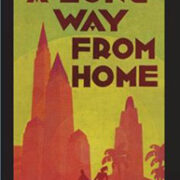A Long Way From Home by Claude McKay
The epub format below is for your Apple and Android devices including Send-to-Kindle.
As you may know, Amazon has changed to the epub format to use with the Send-to-Kindle program. A great feature of the Send-to-Kindle program is that the file will go directly to your Library folder, and not have to be searched for in ES File Explorer or another app. If you use the mobi format in Send-to-Kindle, you will now get an error message. You can see instructions about Send to Kindle at https://www.amazon.com/gp/sendtokindle/email.
If you or your students want to download directly from this web site to an Amazon device, you can use the mobi format below. When you find the mobi file in ES File Explorer, it will then open in the Kindle app on your tablet. If you download an epub file to your Amazon tablet, it will also open if you have an app such as Overdrive on your tablet. The Kindle app offers an excellent reading experience to start with. Overdrive may need some customization of font size.
Download mobi file here.
Claude McKay’s long odyssey from Jamaica to Harlem, Europe, North Africa, Russia, and back to America is chronicled in this autobiography of the most militant writers to emerge from the New Negro movement following World War I. Whether in the intellectual circles of Harlem and Greenwich Village, the docks of Marseilles, or the inner circles of post-revolutionary Russia, McKay’s contact with such figures as Frank Harris, Max Eastman, George Bernard Shaw, W.E.B Dubois, James Weldon Johnson, Charles Chaplin, H.G Wells, Sinclair Lewis, Trotsky, and Radek all served to advance those views which would be so widely accepted in the 1960—Black Pride, self-determination, and the necessity for Black culture to define itself. Source: Amazon.
From Wikipedia at https://en.wikipedia.org/wiki/Claude_McKay
Festus Claudius “Claude” McKay OJ (September 15, 1890[1] – May 22, 1948) was a Jamaican-American writer and poet. He was a central figure in the Harlem Renaissance.
Born in Jamaica, McKay first travelled to the United States to attend college, and encountered W. E. B. Du Bois’s The Souls of Black Folk which stimulated McKay’s interest in political involvement. He moved to New York City in 1914 and, in 1919, he wrote “If We Must Die”, one of his best known works, a widely reprinted sonnet responding to the wave of white-on-black race riots and lynchings following the conclusion of the First World War.
A poet from the first, he also wrote five novels and a novella: Home to Harlem (1928), a best-seller that won the Harmon Gold Award for Literature; Banjo (1929); Banana Bottom (1933); Romance in Marseille (written in 1933, published in 2020), a novella, Harlem Glory (written in 1938-1940, published in 1990), and Amiable With Big Teeth: A Novel of the Love Affair Between the Communists and the Poor Black Sheep of Harlem (written in 1941, published in 2017).
Besides these novels and four published collections of poetry, McKay also authored a collection of short stories, Gingertown (1932); two autobiographical books, A Long Way from Home (1937) and My Green Hills of Jamaica (published posthumously in 1979); and Harlem: Negro Metropolis (1940), consisting of eleven essays on the contemporary social and political history of Harlem and Manhattan, concerned especially with political, social and labor organizing. His 1922 poetry collection, Harlem Shadows, was among the first books published during the Harlem Renaissance and his novel Home To Harlem was a watershed contribution to its fiction. His Selected Poems was published posthumously, in 1953. His Complete Poems (2004) includes almost ninety pages of poetry written between 1923 and the late 1940s, most of it previously unpublished, a crucial addition to his poetic oeuvre.
McKay was introduced to British Fabian socialism in his teens by his elder brother and tutor Uriah Theodore, and after moving to the United States in his early 20s encountered the American socialist left in the work of W. E. B. Du Bois and through his membership in the Industrial Workers of the World (IWW) — the only American left-labor organization of the era that was totally open to Negro members (as he comments), continuing the tradition of the populist People’s Party of the previous generation. In the course of the teens he became acquainted with the writings of Marx and the programs of a variety of activists. As a co-editor of The Liberator magazine, he came into conflict with its hard-line Leninist doctrinaire editor Mike Gold, a contention which contributed to his leaving the magazine. In 1922–1923, he traveled to the Soviet Union to attend a Congress of the International, there encountering his friend Liberator publisher Max Eastman, a delegate to the Congress. In Russia, McKay was widely feted by the Communist Party. While there, he worked with a Russian writer to produce two books which were published in Russian, The Negroes of America (1923), a critical examination of American black-white racism from a Marxist class-conflict perspective, and Trial By Lynching (1925); translations of these books back into English appeared in 1979 and 1977 respectively; McKay’s original English texts are apparently lost. In the Soviet Union, McKay eventually concluded that, as he says of a character in Harlem Glory, he “saw what he was shown.” Realizing that he was being manipulated and used by the Party apparatus, and responding critically to the authoritarian bent of the Soviet regime, he left for Western Europe in 1923, first for Hamburg, then Paris, then the South of France, Barcelona and Morocco.
After his return to Harlem in 1934, he found himself in frequent contention with the Stalinist New York City Communist Party which sought to dominate the left politics and writing community of the decade. His prose masterpiece, A Long Way From Home, was attacked in the New York City press on doctrinaire Stalinist grounds. This conflict is reflected in Harlem: Negro Metropolis and satirized in Amiable With Big Teeth. His sonnet sequence, “The Cycle,” published posthumously in the Complete Poems, deals at length with McKay’s confrontation with the left political machine of the time. Increasingly ill in the mid-40s, he was rescued from extremely impoverished circumstances by a Catholic Worker friend and installed in a communal living situation; later in the decade, he converted to Catholicism.
See more about Claude McKay at https://en.wikipedia.org/wiki/Claude_McKay




Leave a Reply
Want to join the discussion?Feel free to contribute!